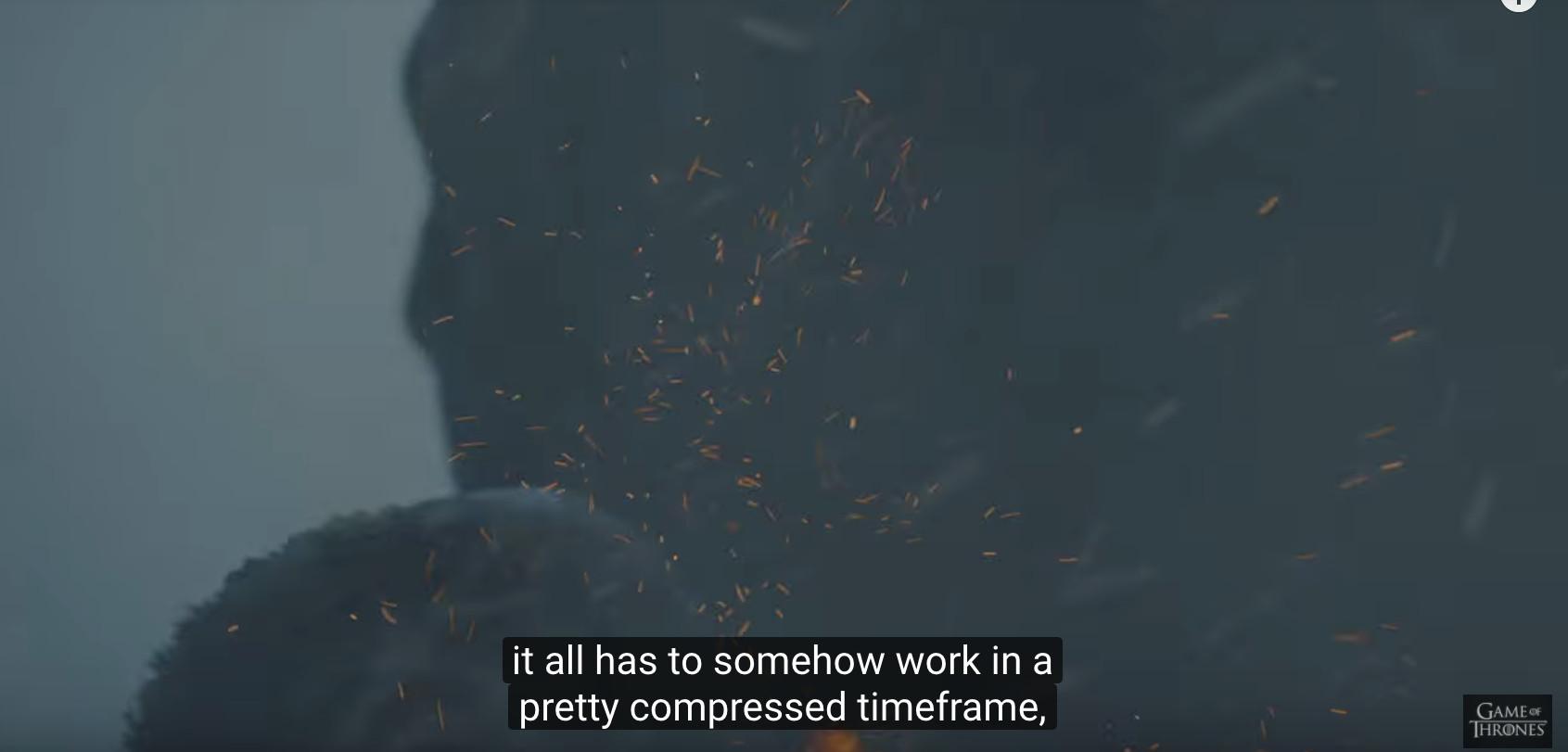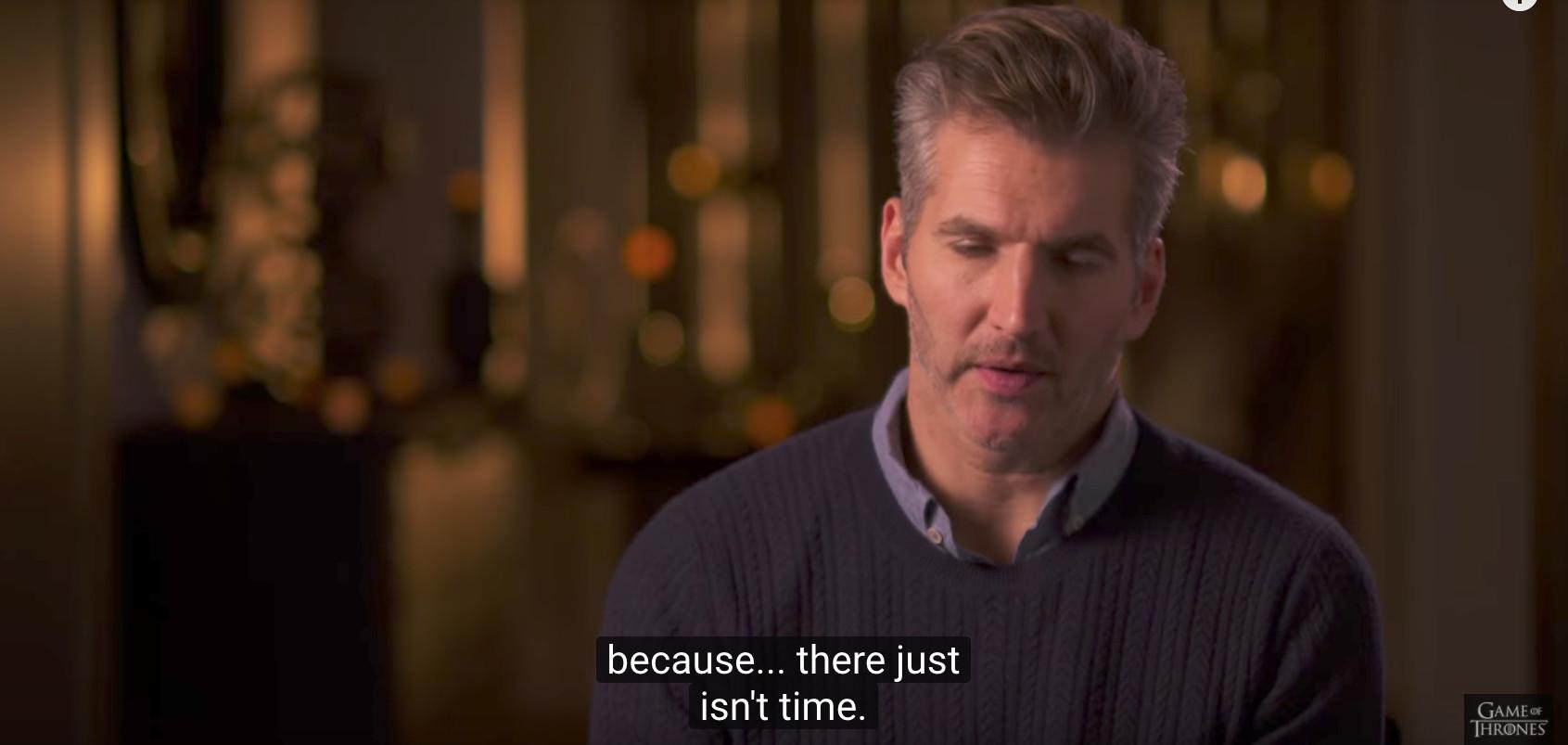During last week’s episode of Game of Thrones, “Beyond the Wall,” we were briefly transported back to the show’s original narrative gantlet. As Arya Stark and her sister Sansa squared off in a bout of sisterly cat-and-mouse, teasing out a tension that had been bubbling beneath the surface, Arya raised the specter of her elder sister’s complicity in the death of their father, Ned.
“I remember you standing on that platform with Joffrey and Cersei when they dragged father to the block,” Arya tells Sansa, seething. “I remember the pretty dress you were wearing. I remember the fancy way you did your hair.”
“You were there?” Sansa replies, stunned.
“I was there, standing in the crowd near Baelor’s statue.”
“And what did you do? Did you come running to the rescue, did you fight off the Lannisters and save father?”
“I wanted to,” Arya says.
“But you didn’t,” Sansa responds defiantly. “Just like me.”
It was a callback to the ninth episode of the show’s first season, a harbinger of things to come on HBO’s newest prestige drama. Joffrey, a villainous and powerful brat, defied his mother Cersei, his new bride Sansa, and the sanctity of the realm, and ordered the execution of Ned. It is, to this day, a bracing piece of storytelling. Watching it again, I can recall the certainty I had that an unseen savior was just around the corner, waiting to spring forth to save Ned, murder Joffrey, and restore peace to Westeros. That … well, that didn’t happen.
By now, it has become axiomatic to say that Game of Thrones rose to ubiquity in American popular entertainment when it killed Ned, the character most (non-book-reading) viewers of the show’s first season believed to be its hero. Portrayed by Sean Bean, a veteran of Peter Jackson’s Lord of the Rings series of films, Ned was a figure of dour integrity and hard-won nobility—the Hand of the King, he was proximate to royalty but grounded in family. He fought well, cared deeply, and sought justice. He was fair and valiant. When he had his head cut off by order of Joffrey, a mad child of incest, it felt as if Thrones’ storytelling wheel had slipped off its axle and rolled away. What is this show doing?, I can remember asking myself, genuinely shocked and impressed by the way it unveiled the major death of the character that seemed to tie together a literal world’s worth of history and consequence. But then, this is a show that breaks wheels.
Ned’s death—like that of Janet Leigh’s character in Psycho, or perhaps, less pretentiously, Samuel L. Jackson’s in Deep Blue Sea—was both a narrative fake-out and a proclamation of intent: forget expectations, subversion reigns on Game of Thrones. Through nearly seven seasons, we have seen narrative choices designed to stun us into submission: the death of Prince Valiant (Robb Stark’s eventual death); the behanding and cuckolding of a fearless knight (Jaime Lannister’s appendage reduction and embarrassment); the Warrior Queen’s failures at war (Daenerys’s losses at Dorne and Highgarden, the death of a seemingly impervious dragon). Buttressing those subversions is a clear motivation: plot.
I watch nearly 300 movies a year, an unhealthy habit that has devolved into professional responsibility. In doing so, you come to see the gears grinding into place as a movie plods along. It has come to feel like slow motion for me. That stolen glance between two characters means they’re having an affair; that gun casually shoved into a drawer is the murder weapon; a guy with a stomach ache probably has an alien growing inside his belly. Julia Roberts ends up with the nice guy. Tom Cruise jumps out of the plane without a parachute, and survives. Movies are predictable, and that makes some viewers—many viewers—feel safe. Game of Thrones has never been safe.
Series author George R.R. Martin and HBO’s adapters and showrunners, David Benioff and D.B. Weiss, savor the head fake, lapping up expectations and dunking them into the wastebasket. But all a pivot really does is point toward a new direction. Inevitably, that means story choice. If Ned Stark dies, the show must find a new hero. In the Stark family—eldest brother Robb, poor little rich queen Sansa, vengeance-seeking daughter Arya, disabled little boy Bran, and wide-eyed bastard Jon Snow—we found a constellation of heroes to track closely, in whom to find empathy and to expect the unexpected. Robb died; Sansa was betrothed to various monsters, but got her revenge; Arya trained under magical tutors and became a shadowy assassin; Bran transformed into a visionary weirdo; Jon survived impossible odds over and again, only to die and then be resurrected by a sorceress. These were not likely heroes, but in them the show could bloom and unravel, shock and delight. Not every episode was a masterpiece (yikes, Sand Snakes), nor every arc a deft stroke of storytelling (see: all things Ramsay Bolton). But through the uprooted expectations, serious fans of the show always felt like they were being taken care of by writers with steady, patient hands and devious, unsentimental minds. The show moved slowly at times, and explained its history in great detail. But plot—its unknowability, its unpredictability, its power to thrill—is what made Game of Thrones truly special.
Inherent in that power to tell story are all kinds of intellectual paraphernalia—in this show, the hosts of our exhaustive and exceptional podcast Binge Mode have found a beacon for the very notions of myth and poetry. They unpack each episode with rigor and discover meaning where perhaps even the story’s creators could not have seen one. It is literary criticism as fan service as obsessive archaeology. It’s a wonderful podcast. But most people, myself included, just want to see the dragons burn things, or the small man crack wise, or the big man fight his bigger brother. From my vantage point, Game of Thrones’ complex world and arcane rules are catnip not for metaphorical examination, but for cultural hoarders who fill the creases in their brain with things like the origins of Valyrian steel and the proper spelling of “Jaqen H’ghar.” Which family runs Castle Black? Who killed the Mad King? Who slangs oysters, clams, and cockles? These are unusable facts, data points at trivia night, the punch line of a bad tweet. I love gathering these things in my mind, but am at peace with their true value.
That they feel valuable at all is because they have been delivered by a truly extraordinary television show that doesn’t depend on an understanding of those details to demand attention. One that, even if you don’t really like it, is difficult to dismiss as both a formal act of world creation and an emotional magnet. Thrones is the endpoint for our obsession with monoculture, mostly because it has dragged us to this point, with just seven episodes to go, raising stakes and thrusting plot forward with each dramatic death. Dead Ned begat the Red Wedding begat Joffrey’s purple visage begat “Hold the door!” Killing a character is plot’s trump card, its most powerful tool.
In Season 7—uneven, curiously paced, riveting, and confounding so far—death’s power has been teased and never granted. “Beyond the Wall”—the season’s penultimate episode, typically time for a narrative reckoning—conspired to draw seven key characters into one of the show’s most contrived situations yet, only to withdraw the power of plot at the last minute. The character’s plan—retrieve a zombie to show to the evil queen as proof of zombies, so as to unite and fight said zombies—worked, but also failed. There was a death—a dragon death—but there was also a zombie resurrection of the dead dragon. (The drunken priest Thoros of Myr was also killed, though that is a bit like removing James Jones from the Cleveland Cavaliers—he’s nice to have in the locker room, but not exactly providing essential minutes.)
This withholding approach has been surprising, and comes on the heels of major questions about the truncated season, the rushed nature of the episodes, the inexplicable traveling ability of the show’s characters, a betrayal of certain arcs (Arya, for example, has been handled terribly this season), and an all-around sense of discomfort as the show approaches a possible 18-month hiatus before the final season airs. It just hasn’t quite felt like the show we’ve come to know and not be able to predict. (Ice dragon? We called that.) So, if Game of Thrones has lost the ability to effectively deliver that sweet, quenching, stunning plot, what exactly is it anymore?


These are snapshots of the post-show making-of segment that aired after “Beyond the Wall.” Above, we can see David Benioff explain the challenges in telling these massive, often convoluted stories “because … there just isn’t time.” It is, of course, difficult to know what that means, given that Game of Thrones is one of the most popular TV shows of the century, with a massive budget, complex schedule, huge cast and crew, and no preordained end date. And yet, there is a persuasive feeling of finality in these final, somewhat ramshackle episodes—a kind of desperation to just get on with it already. Next week’s finale could be a throbbing sunbeam of fan service: Cleganebowl, a Jon and Daenerys makeout party, a Bran vision, dead Cersei. Or it could be a heaping mound of plot: dead Tyrion, dead Arya, dead Starks, dead dragons, a dead-revived Mountain, dead ends. Or it could conclude in a crushing, unsatisfactory cliffhanger, with no plot to speak of. Which would make it a new show. Maybe even a better one.
Disclosure: HBO is an initial investor in The Ringer.
